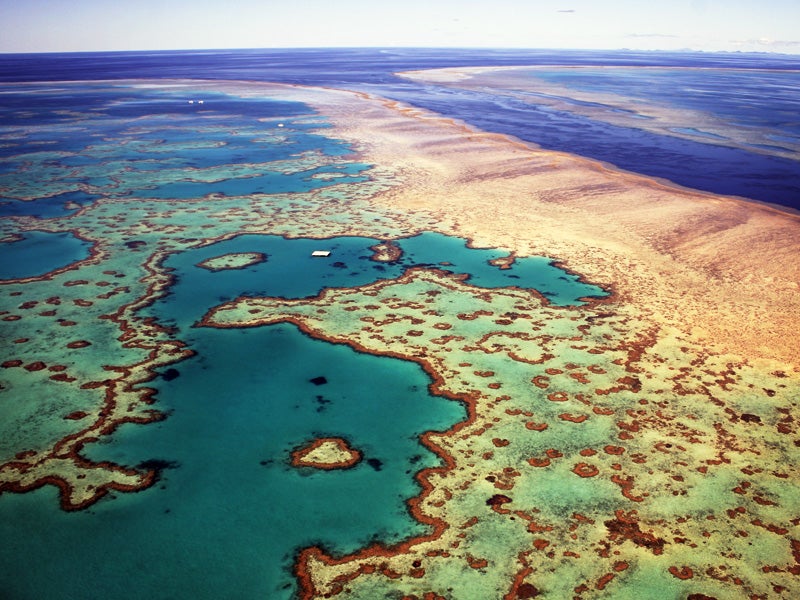With Great Reefs Come Great Responsibilities: World Heritage Committee Calls For Urgent Climate Action To Save World Heritage-Listed Coral Reefs
World Heritage Committee urges all nations to reduce climate pollution to protect coral reefs, but international lawyers say Australia is failing to do its fair share
Contact
Today, the World Heritage Committee expressed serious concern about the impacts of coral bleaching on reefs around the world, from Australia to New Caledonia, Kiribati, and the United States. The Committee reiterated the importance of all countries ambitiously implementing the Paris Agreement, in which countries commit to pursuing efforts to limit global temperature rise to 1.5°C above pre-industrial levels, and undertaking actions to address climate change. Global emissions reductions would significantly reduce the devastating impacts of climate change on World Heritage-listed coral reefs into the future.
But international lawyers say some countries, such as Australia, the custodian of the world’s largest coral reef, are not doing their fair share to protect World Heritage reefs from the impacts of climate change, and must commit to stronger emissions reductions.
Earthjustice attorney Noni Austin, who is present at the Committee meeting and lobbied for the Committee’s action on climate change, said, “Today, the World Heritage Committee expressed its utmost concern about the mass coral bleaching that has seriously harmed World Heritage-listed coral reefs. This bleaching event, which has killed corals around the globe, is due to elevated ocean temperatures caused by climate change. It tells us that climate change is happening now, and with devastating effects.”
“The World Heritage Committee’s decision has confirmed what scientists have been saying for years: urgent and rapid action to reduce global warming and implement the Paris Agreement is essential for the survival of coral reefs into the future.”
“Just prior to the Committee meeting, UNESCO’s World Heritage Centre, in collaboration with the US National Oceanic and Atmospheric Administration’s Coral Reef Watch, released an analysis finding that all 29 World Heritage-listed coral reefs will cease to exist as functioning ecosystems by the end of the century without a substantial reduction in global greenhouse gas emissions.”
“The World Heritage Committee has today reiterated the importance of all countries undertaking actions to address climate change and ambitiously implementing the Paris Agreement, in which countries commit to pursuing efforts to limit global average temperature rise to 1.5°C above pre-industrial levels. A global reduction in greenhouse gas emissions is essential to give coral reefs a chance to survive into the future.”
But international lawyers say some countries are failing to do their fair share to reduce emissions to protect World Heritage-listed coral reefs.
Austin continued, “With great reefs come great responsibilities. Australia provides a case in point. It is custodian of the world’s largest coral reef ecosystem—the Great Barrier Reef—and has primary responsibility for its protection. In fact, Australia has a legal responsibility under the World Heritage Convention to reduce its contributions to climate change.”
“But climate change is killing the Great Barrier Reef: up to 50% of the Reef’s coral may have died in the last two years, due to back-to-back annual bleaching events.”
Late last week, the World Heritage Committee noted its serious concern about the bleaching and mortality that affected the Reef over the past two years.
“Despite the deterioration of the Reef, Australia is not doing its fair share to reduce its contributions to climate change. Australia’s emissions are continuing to rise, and it is unlikely to meet its emissions reduction targets under the Paris Agreement, targets that in any event do not represent its fair share of global emissions reductions.”
“Australia is also supporting new coal mines, which will lock in emissions that will harm the Great Barrier Reef for decades to come.”
“To protect the Reef into the future, now more than ever Australia must make stronger emissions reductions, remove its support for dirty coal mines, and become a world leader in the transition to renewable energy. We can have coral or coal, not both.”
For background and comment:
Earthjustice and Environmental Justice Australia, World Heritage and Climate Change: The Legal Responsibility of States to Reduce Their Contributions to Climate Change – A Great Barrier Reef Case Study (2017)

Additional Resources
About Earthjustice
Earthjustice is the premier nonprofit environmental law organization. We wield the power of law and the strength of partnership to protect people's health, to preserve magnificent places and wildlife, to advance clean energy, and to combat climate change. We are here because the earth needs a good lawyer.